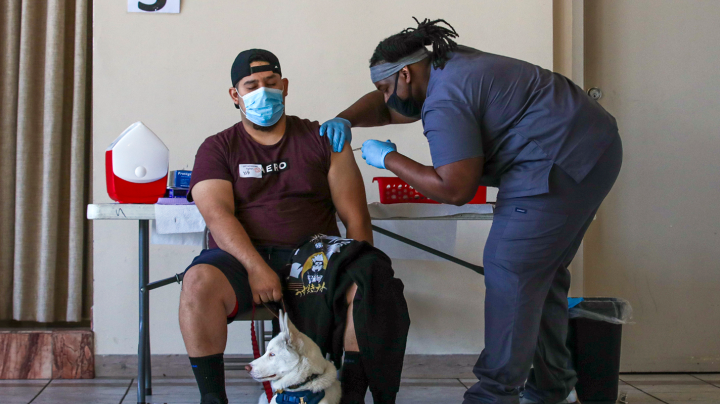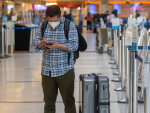Here’s What’s Going On With the Johnson & Johnson & AstraZeneca Vaccines

Joel Jurez, 22, holds hid dog Yuki as medical assistant Adrian Davis administers a COVID-19 vaccine at a vaccination clinic established by Councilman Curren Price in partnership with St. John's Well Child and Family Center at St. Patrick's Catholic Church on Friday, April 9, 2021 in Los Angeles, CA. Irfan Khan / Los Angeles Times via Getty Images
States have taken a “pause” on the distribution of COVID-19 vaccines from Johnson & Johnson after reports of rare blood clotting happening in six cases of the more than 6.8 million doses that have been administered thus far in the United States.
According to Dr. Anthony Fauci, the nation’s top infectious disease specialist, the clotting in these six cases seems like the same issue that recently arose in some patients in Europe who were given the AstraZeneca vaccine.
“There are some rather strong similarities about this with regard to the timeframe following vaccination, particularly, importantly, the clinical syndrome of these clots together with low platelets,” Fauci told TODAY on Wednesday morning (April 14). “So, there are a lot of similarities there that you just can’t miss.”
The AstraZeneca vaccine is linked to 222 suspected cases of blood clotting and 30 deaths of the 34 million people in Europe who have received their first dose. Many countries in Latin America have received the AstraZeneca vaccine to administer to its citizens. According to the Americas Society/Council of the Americas, the Health Ministry in Paraguay paused the AstraZeneca vaccine for people under 55. Other Latin American countries that have received doses of the AstraZeneca vaccine include Brazil, which received 2.8 million doses in early February, and Nicaragua, which received 200,000 doses in early March.

The six cases of blood clotting from the J&J vaccine all occurred with women patients between the ages of 18 and 48. In all cases, clotting took place between six to 13 days after the vaccine was administered.
While the U.S. Food and Drug Administration (FDA) and the Centers for Disease Control and Prevention (CDC) advised states to pause the J&J vaccine, health experts say patients should not be concerned if they have already received it.
“You don’t want people who just received the vaccine to be overly worried about this,” Fauci said. “This is a rare occurrence. The pause is just as an abundance of caution.”
Fauci believes it will take “days to weeks” for a decision to be made by an advisory committee on whether the J&J vaccine should continue to be administered for the protection of COVID-19.
“I think we’re going to be hearing about a decision pretty quick,” Fauci said. “I don’t think this is something that’s going to drag out. They want to take a quick pause, take a look at it [and] see what’s going on.”